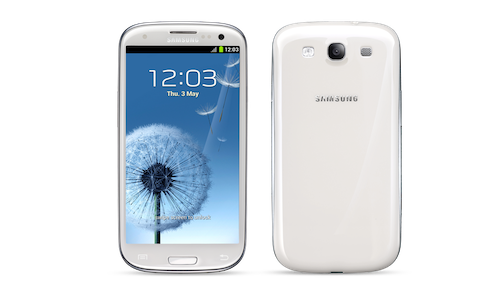Has the iPhone Finally Met Its Match?
Surprise! Samsung's new Galaxy S III smartphone could rival Apple's (NAS: AAPL) iPhone 4S in unit sales. In a press briefing this week, the South Korean electronics manufacturer predicted 10 million Galaxy S III handsets sold by July, implying a run rate of 30 million or more by the end of the quarter.
To be fair, we don't know exactly what "by July" means -- is it July 1, or by the end of July? But we do know that 4S helped Apple sell some 37 million handsets in the company's fiscal first quarter ended in December.
Samsung could get within spitting distance of that total if demand continues as it has, helping the company extend its lead over Apple in a worldwide race for smartphone market share. If so, it would at least partially explain why Apple has been adamant about stopping sales of the device here in the United States. Instead, the S III went on sale on June 21.
A worthy rival
There's a lot to like about the Galaxy S III. Carriers certainly approve. As Wired rightfully points out, Samsung is the only supplier aside from Apple to prevent AT&T and Verizon from placing logos on their handsets.
The implication? Users see the Galaxy series not so much as an iPhone wannabe, but as a peer device that looks about as sleek:

Source: Samsung.
Functionally, the Galaxy S III includes a variety of features that highlight the "smart" in "smartphone." S Voice, Samsung's answer to Siri, is purported to be capable of launching apps -- Apple plans something similar in the next version of iOS -- and pairs with a pop-up video function for watching streams while performing other tasks.
Other features include "social tag," in which the S III uses photos to track and identify the social-network status of friends and family you're connected to. And "Smart stay" keeps the S III's screen bright for as long as you're looking at it. (Check out the entire list of features.)
Get in the fast lane, Apple
If there's a flaw with the S III, it's that the phone customizes Android, a platform that already suffers from so many customizations that upgrading could prove frustrating for users. Buyers are apparently ignoring this potential hazard in favor of the speed the S III offers -- unsurprising when Apple could take till this fall or later to deliver a hyperfast LTE phone, and even that may be too soon.
Meanwhile, Nokia's (NYS: NOK) Lumia Windows Phone also supports AT&T's LTE network. Microsoft's (NAS: MSFT) commitment to a common code base for both mobile and desktop versions of Windows 8 should help usher in a flood of new apps for future Lumia models.
How will Apple respond? With the blunt force of a remarkable new handset, I suspect. For now, Samsung's Galaxy S III is selling as if it's every bit the iPhone's equal.
Think I'm right? Wrong? Either way, mobile devices are changing how we communicate, conduct commerce, entertain ourselves, and more. Our top tech analysts call this shift "The Next Trillion-Dollar Revolution," and they've created a report that singles out the one stock they believe will benefit most. Their research is yours for the asking but only for a limited time. Get a copy of the report -- it's totally free.
The article Has the iPhone Finally Met Its Match? originally appeared on Fool.com.
Fool contributorTim Beyersis a member of theMotley Fool Rule Breakersstock-picking team and the Motley Fool Supernova Odyssey I mission. He owned shares of Apple at the time of publication. Check out Tim'sWeb home,portfolio holdings, andFoolish writings, or connect with him onGoogle+or Twitter, where he goes by@milehighfool. You can also get his insightsdelivered directly to your RSS reader.The Motley Fool owns shares of Apple and Microsoft.Motley Fool newsletter serviceshave recommended buying shares of and creating bull call spread positions in Apple and Microsoft. The Motley Fool has adisclosure policy. We Fools don't all hold the same opinions, but we all believe thatconsidering a diverse range of insightsmakes us better investors. Try any of our Foolish newsletter servicesfree for 30 days.
Copyright © 1995 - 2012 The Motley Fool, LLC. All rights reserved. The Motley Fool has a disclosure policy.

